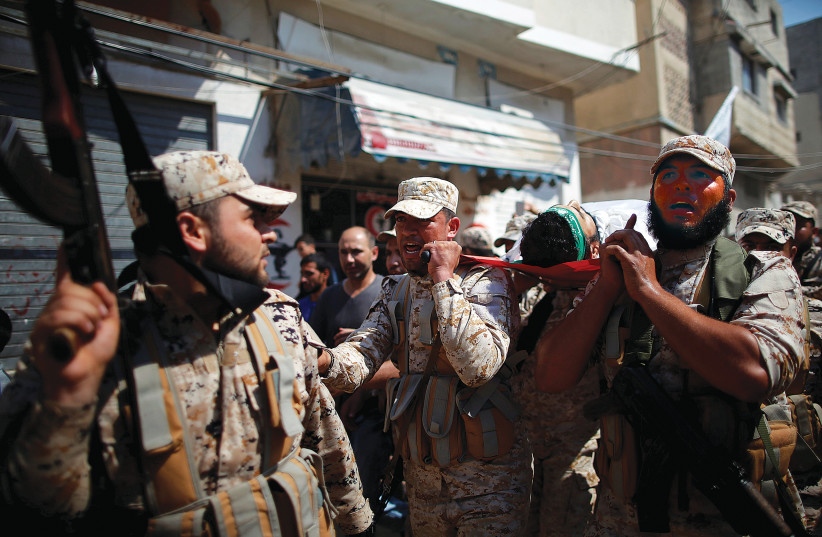by Khaled Abu Toameh
“We have shown that we can go to war without Hamas,” said a PIJ official. “We are no longer seen as the little brother of Hamas.”
 |
HAMAS TERRORISTS carry the body of their comrade Mahmoud al-Adham, 28, during his funeral in the northern Gaza Strip in July.
(photo credit: MOHAMMED SALEM/REUTERS)
|
Hamas’ failure to join the round of fighting between Israel and Palestinian Islamic Jihad, which began after Tuesday’s assassination of PIJ commander Bahaa Abu al-Ata, was one of the main reasons why PIJ agreed to the Egyptian-brokered ceasefire, Palestinians said on Thursday.
The heavy casualties PIJ suffered during the two days of fighting also contributed to the terror group’s decision to accept Egypt’s mediation efforts, they said.
Palestinian political analysts claimed that Israel relayed a message to Hamas shortly after the targeted killing of al-Ata to the effect that the IDF would not target the movement as long as it does not fire rockets at Israel. The message, they said, was delivered to Hamas through senior Egyptian intelligence officials.
Hamas, meanwhile, is facing sharp criticism from many Palestinians for its refusal to join the fighting with Israel. Some PIJ officials have also privately criticized the Hamas stance.The officials were quoted as saying that the leaders of Hamas are afraid of “losing the Qatari suitcases of cash,” reference to Qatar’s cash grants that were delivered to the Gaza Strip in the context of the ceasefire understandings reached with Israel earlier this year under the auspices of Egypt and the United Nations.In response, Hamas officials said that the movement’s long-standing position is that any decision to go to war with Israel should be taken by all Palestinian factions in the Gaza Strip, and not by one alone.PIJ officials on Thursday tried to depict their agreement to the ceasefire as a “victory,” insisting that Israel had “begged” the Egyptians and UN mediators for an end to the violence. They claimed that the Iranian-backed PIJ has consolidated its role as a major player in the Hamas-ruled Gaza Strip by engaging alone in two days of fighting with Israel. The PIJ officials also boasted that their rockets had paralyzed half of Israel, prompting it to seek a quick end to the violence.“We have shown that we can go to war without Hamas,” said a PIJ official. “We are no longer seen as the little brother of Hamas.”Hamas, on the other hand, has emerged from the Israel-PIJ conflict as the “responsible adult” that managed to avoid plunging the Gaza Strip into another war with Israel. Hamas is already facing growing discontent over its failure to improve the living conditions of Palestinians, and the last thing it needs now is another war that would further undermine its rule over the coastal enclave.It now remains to be seen how Iran will react to Hamas’ failure to help Tehran’s major proxy, PIJ. In recent years, Hamas has made a big effort to mend fences with Iran in wake of the crisis that erupted between the two parties over the civil war in Syria. Hamas’ failure to side with Syrian President Bashar Assad against the opposition forces in his country angered Tehran, whose leaders responded by reducing financial and military aid to Hamas.
Khaled Abu Toameh
Source: https://www.jpost.com/Arab-Israeli-Conflict/By-abandoning-PIJ-Hamas-risks-sparking-crisis-with-Iran-analysis-607876
Follow Middle East and Terrorism on Twitter
No comments:
Post a Comment